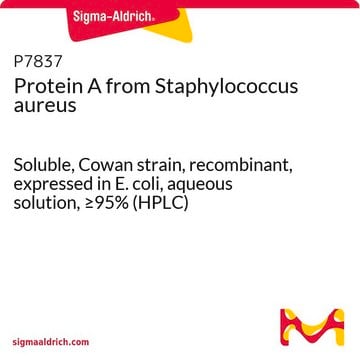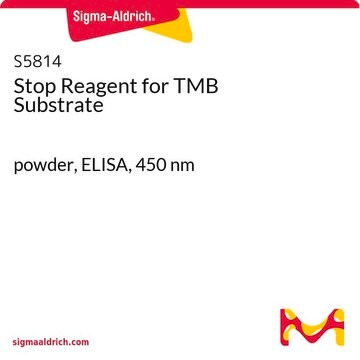87748
3,3′,5,5′-Tetramethylbenzidine
TMB substrate, chromogenic, ≥98.0% (NT), powder
Synonym(s):
BM blue, Sure Blue TMB, TMB, TMB Blotting Plus, TMB substrate
About This Item
Recommended Products
product name
3,3′,5,5′-Tetramethylbenzidine, ≥98.0% (NT)
Quality Level
Assay
≥98.0% (NT)
form
powder
technique(s)
UV/Vis spectroscopy: suitable
mp
166-171 °C
168-171 °C (lit.)
storage temp.
2-8°C
SMILES string
Cc1cc(cc(C)c1N)-c2cc(C)c(N)c(C)c2
InChI
1S/C16H20N2/c1-9-5-13(6-10(2)15(9)17)14-7-11(3)16(18)12(4)8-14/h5-8H,17-18H2,1-4H3
InChI key
UAIUNKRWKOVEES-UHFFFAOYSA-N
Looking for similar products? Visit Product Comparison Guide
Application
- enzyme-immunoassay (EIA)
- indirect competitive enzyme-linked immunosorbent assay (ELISA)
- sandwich enzyme-linked immunosorbent assay
Signal Word
Warning
Hazard Statements
Precautionary Statements
Hazard Classifications
Acute Tox. 4 Oral - Aquatic Chronic 4 - Carc. 2
Storage Class Code
11 - Combustible Solids
WGK
WGK 3
Flash Point(F)
Not applicable
Flash Point(C)
Not applicable
Personal Protective Equipment
Regulatory Listings
Regulatory Listings are mainly provided for chemical products. Only limited information can be provided here for non-chemical products. No entry means none of the components are listed. It is the user’s obligation to ensure the safe and legal use of the product.
JAN Code
87748-INTR:
87748-5G:
87748-1G:
87748-VAR:
2550035:
87748-BULK:
87748-25G:
Certificates of Analysis (COA)
Search for Certificates of Analysis (COA) by entering the products Lot/Batch Number. Lot and Batch Numbers can be found on a product’s label following the words ‘Lot’ or ‘Batch’.
Already Own This Product?
Find documentation for the products that you have recently purchased in the Document Library.
Customers Also Viewed
Our team of scientists has experience in all areas of research including Life Science, Material Science, Chemical Synthesis, Chromatography, Analytical and many others.
Contact Technical Service










